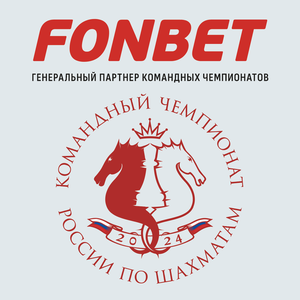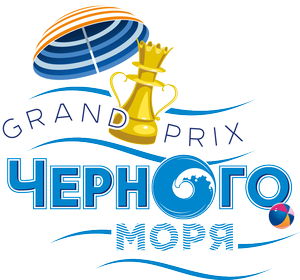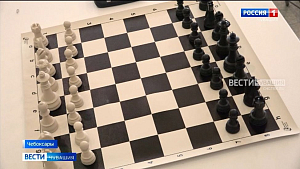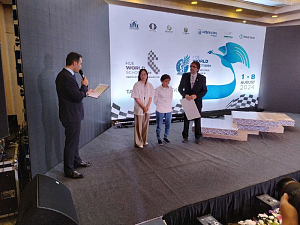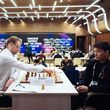18 August 2015
A Day of Costly Errors
Eteri Kublashvili reviews the Round Seven of the Superfinal.
At the moment when a day off was expected to refresh the players to the extent that they show up with recharged vigor for the round to come, a food quality problem has suddenly advanced to the forefront. It appears that the hotel restaurant food has never been a much complained about issue, and the Sunday dinner did not provide any cause for concerns either. The next morning, however, it became obvious that several participants have been food poisoned, and the two games have been postponed by one hour for this particular reason. This incident, however, (I do want to believe that nothing of the kind will ever happen again, and everyone suffering will very soon completely restore his or her health!) has introduced adjustments into the work-day schedule. Round seven has seen a lot of blunders and a great deal of decisive games, for that matter.
In the men’s tournament Evgeny Tomashevsky has outplayed Ildar Khairullin in a technical style and in the endgame that followed he managed to throw a mating net over his opponent’s king, having thus become a sole leader.
The winning streak of Vladislav Artemiev has been stopped by Sergey Karjakin, who took his opponent by surprise with a rare idea in the so well-analysed Najdorf Defence. Black emerged out of the opening in a pretty good shape, whereas in the middlegame Vladislav refused repetition of moves and ended up in a worse position. Sergey neutralized his opponent’s threats and went on to achieve a winning position.
Although Nikita Vitiugov found himself in a plight against Igor Lysyj, he managed to bail out in the final run thanks to the nice combination that ended in a perpetual check.
Dmitry Jakovenko, playing White, put pressure on Alexander Motylev, won two pawns, but, having consumed a lot of time along the way, forced a draw by a perpetual check in a complex position.
The Bukavshin – Svidler encounter in the Grunfeld Defence was unanimously called the game of the day by the commentators. Whereas the upheavals of this duel were explained in much detail by Peter in the English online coverage, we are going to confine ourselves to paying attention to the moments that belong to the sharpest stage of the game that occurred in time trouble.
Bukavshin – Svidler
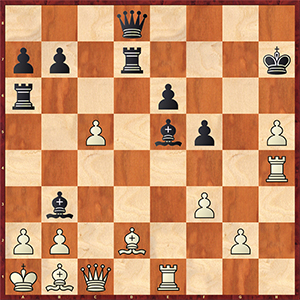
Shortly prior to the control move Ivan came up with 36. Rb4, which was accurately met by 36…Bxa2! 37. Bxa2 Qa5
The engine says that more precise is 37…Rxd2, followed by ...Qd5 in response to almost any reasonable move. If White takes on b7 with check, the black king retreats to h8, reintroducing the threat of Qd5. What happened in the game, however, allowed some respite to the first player.
38. Qc4 Rxd2 39. Rxb7+ Kh8 40. Rb5
As the grandmaster from St. Petersburg admitted himself, this move had escaped his attention.
40…Qa3
According to Peter, 40...Qd8 was stronger, but during the game he made his move very quickly, getting sight of the retreat to the eighth rank only later.
41. Rb8+ Kh7 42. Rb7+ Kh6
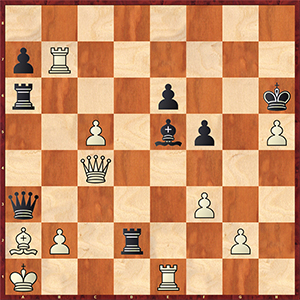
43. Qf4+! Bxf4 44. bxa3 Rxb3 45. Rb2
Attack and defense have cancelled each other, and in the endgame with opposite-colored bishops a peace agreement was signed.
Denis Khismatullin and Daniil Dubov were trying to sort things out in a position with non-standard material ratio, which arose soon after the opening part of the game.
Khismatullin – Dubov
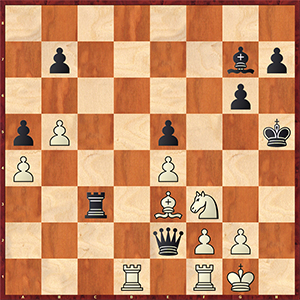
Black recklessly played 29...Qc2, which White could have answered by 30. Rc1 with the following exemplary line 30...Qd3 31. Rxc3 Qxc3 32. Rc1 Qb3 33. Rc7 – when the b7-pawn is as good as lost, while the White’s b-pawn is turning into a real threat.
In the game, however, White displayed hesitation and soon found himself in a worse position.
30. Rfe1 g5 31. Nh2 Rd3 32. Rc1 Qxa4 33. b6 Kg6 34. Nf1 Qxe4, and Black gradually converted his material advantage.
Alexandra Goryachkina was the hero of the day in the women's tournament. Despite her not feeling well, Aleksandra managed to neutralize her opponent’s pressure, overtaking the initiative and converting two extra pawns against Olga Girya in a queen ending. In the course of the game that featured over 120 moves and more than six hours of play, a lot of things happened: both opponents found the strongest continuations mixed with wrong decisions. Yet, the fact remains that the Russian Women’s team consists of very combative players!
The game of Alexandra Kosteniuk against Anastasia Savina featured a lot of blunders and oversights, as was admitted by the former World Champion during the after the game press conference. However, Anastasia was the last to commit a blunder.
Kosteniuk – Savina
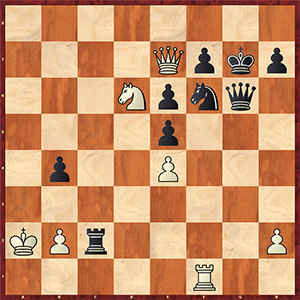
A good practical chance to make a draw presented itself to Black in this position: 38…Rxb2+ 39. Kxb2 Qg2+ 40. Kb3 Qxf1 41. Qxf7+ Kh6 42. Qxe6 Kg6.
In the game there followed, however: 38…b3+? 39. Ka3 Rc6 40. Rxf6! Ra6+ 41. Kxb3 Rb6+ 42. Ka4 Black resigns.
Valentina Gunina, being a fighter to the marrow of her bones, refused to accept a tacit draw in the game against Ekaterina Kovalevskaya, thus allowing her opponent to get an edge in the ending.
Kovalevskaya – Gunina
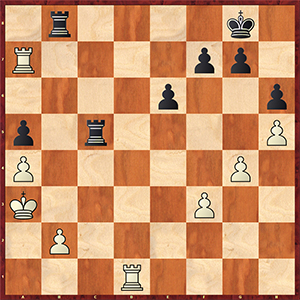
42…Rc2 would have resulted in the repetition of moves, whereas 42…Re5?! allowed White an opportunity of regrouping his pieces in a comfortable manner:
43. Rd3 Rc8 44. b3 Rb8 45. f4 Re4 46. Rf3 Re1 47. Rxa5, and, despite her opponent’s having put up a hard resistance, Ekaterina went on to win the game.
Kateryna Lagno outplayed Alina Kashlinskaya in the endgame. Evgenija Ovod came out of the opening against Marina Guseva in a very good shape, winning the game by delivering a cute blow in an overwhelming position. The game Pogonina – Bodnaruk ended in a draw.
After seven rounds the sole lead in the men’s tournament was taken by Evgeny Tomashevsky, who has scored 5 points. Sergey Karjakin and Nikita Vitiugov are half a point behind.
In the women’s tournament Alexandra Kosteniuk and Aleksandra Goryachkina have scored 5.5 points. Kateryna Lagno is trailing a full point behind them.








